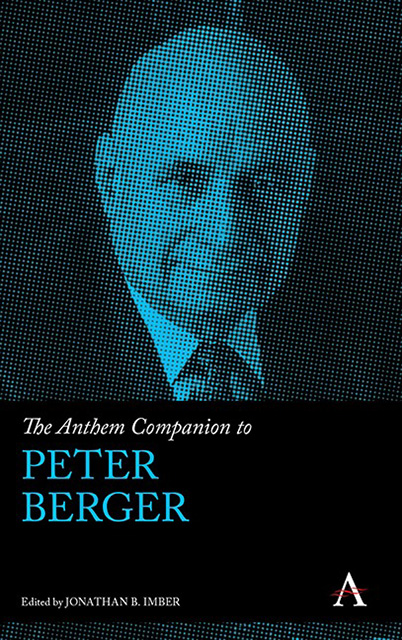Book contents
- Frontmatter
- Contents
- Introduction
- Chapter 1 Plurality, Choice, and The Dynamics of Doubt
- Chapter 2 Peter L. Berger and The Challenge of Modern Pluralism
- Chapter 3 Making Peace With Pluralism In America
- Chapter 4 Religion and Secularity in A Desecularizing Russia
- Chapter 5 The Moral Limits of Religious Pluralism
- Chapter 6 Peter L. Berger and Arnold Gehlen: Secularization, Institutions and Social Order
- Chapter 7 Peter L. Berger’s Three Religions
- Chapter 8 Objectivation: The Material Heritage of Peter L. Berger
- Chapter 9 Peter L. Berger’s The Social Construction of Reality
- Chapter 10 The Untaken Road to Phenomenological Sociology
- Chapter 11 Cheering for Capitalism
- Chapter 12 Peter L. Berger and Economic Sociology
- Chapter 13 Peter L. Berger Changed The Direction of My Work … and My Life
- Chapter 14 Peter L. Berger On Religion as Choice Rather Than Fate
- List of Contributors
- Index
Chapter 5 - The Moral Limits of Religious Pluralism
Published online by Cambridge University Press: 17 October 2023
- Frontmatter
- Contents
- Introduction
- Chapter 1 Plurality, Choice, and The Dynamics of Doubt
- Chapter 2 Peter L. Berger and The Challenge of Modern Pluralism
- Chapter 3 Making Peace With Pluralism In America
- Chapter 4 Religion and Secularity in A Desecularizing Russia
- Chapter 5 The Moral Limits of Religious Pluralism
- Chapter 6 Peter L. Berger and Arnold Gehlen: Secularization, Institutions and Social Order
- Chapter 7 Peter L. Berger’s Three Religions
- Chapter 8 Objectivation: The Material Heritage of Peter L. Berger
- Chapter 9 Peter L. Berger’s The Social Construction of Reality
- Chapter 10 The Untaken Road to Phenomenological Sociology
- Chapter 11 Cheering for Capitalism
- Chapter 12 Peter L. Berger and Economic Sociology
- Chapter 13 Peter L. Berger Changed The Direction of My Work … and My Life
- Chapter 14 Peter L. Berger On Religion as Choice Rather Than Fate
- List of Contributors
- Index
Summary
In the final phase of his life from the autumn of 2016 to April of 2017, Peter Berger was preparing a major international research project he intended to lead together with me when I was at that time the director of the Academy of World Religions of Hamburg University. The endeavor to explore the moral limits of religious pluralism in an international consultation process was cut short by his death on 27 June 2017. Yet its goal is too important to allow it to be forgotten.
The intent of this chapter is, on the one hand, to outline the project as it emerged (cf. Weisse 2019) and lay out the ideas underlying it. On the other hand, it is also intended to give readers an insight into Berger’s strategic thinking as it found expression in our planning. A selection of e-mails he wrote during the planning phase between November 2016 and April 2017— two months before his death—will serve to illuminate his thinking “from the inside.” They demonstrate the seriousness and tenacity needed to initiate such a major project, but they also offer refreshing glimpses of his kind humor and sarcastic wit. Finally, it will paradigmatically take up the approaches developed in a discussion that took place at a commemorative event one year after his death (Weisse and Steets 2019) and sketch perspectives for further academic engagement.
The Ideas Underlying the Project “The Moral Limits of Religious Pluralism
Until the turn of the millennium, Peter Berger had viewed the secularization thesis as key to religious sociology. By the early twenty-first century, though, he was beginning to doubt its validity. At the same time, he came to regard the increasing religious pluralization of Western societies as the central development. He went on record stating: “The idea that modernity secularizes, inevitably secularizes, is wrong. Full stop. This is empirically wrong. What modernity inevitably does is: it pluralizes.” (Berger and Weisse 2010, 19). He further elaborated this approach in the context of his theory of “two pluralisms” developed after 2014:
For some two centuries the ruling paradigm for the relation between modernity and religion has been so-called secularization theory, assumed both those who welcomed and those who deplored the advent of an allegedly secular era […] The key proposition of secularization theory can be stated succinctly: Inevitably, the more modernity, the less religion.
- Type
- Chapter
- Information
- The Anthem Companion to Peter Berger , pp. 47 - 60Publisher: Anthem PressPrint publication year: 2023



